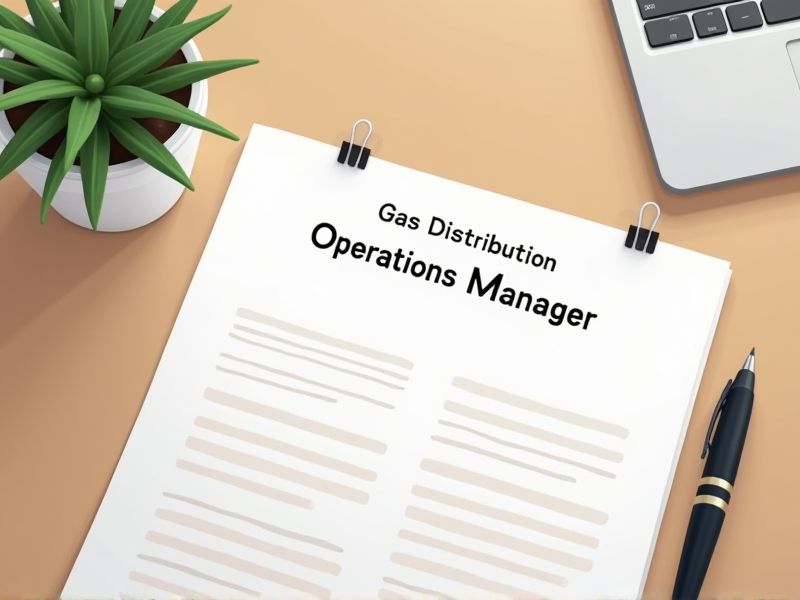
Gas Distribution Operations Managers oversee complex networks that require precise knowledge and adherence to safety regulations. Proper certifications ensure these managers possess the technical skills and understanding of industry standards, minimizing risks associated with gas distribution. Certification also demonstrates a commitment to continuous improvement and competence in emerging technologies. Here are some important certifications you may need as a Gas Distribution Operations Manager.
Certified Gas Distribution Professional (CGDP)
The Certified Gas Distribution Professional (CGDP) credential equips a Gas Distribution Operations Manager with specialized knowledge, ensuring safer and more efficient distribution operations. It helps standardize best practices across the industry, reducing the risk of accidents and operational discrepancies. Possessing CGDP certification often leads to optimized processes and cost savings due to enhanced strategic understanding and problem-solving skills. The credential also enhances professional credibility, which can influence stakeholder trust and facilitate smoother regulatory compliance interactions.
Certified Energy Manager (CEM)
A Certified Energy Manager can significantly enhance the operational efficiency of a Gas Distribution Operations Manager by identifying energy-saving opportunities, which reduces overhead costs. The CEM's expertise in energy auditing equips managers to better assess and mitigate environmental impact, aligning operations with sustainability goals. Structured energy management plans developed by CEMs ensure compliance with regulatory standards and enhance safety in distribution networks. The optimized energy utilization and systems management increase reliability and performance in gas distribution operations.
Certified Safety Professional (CSP)
A Certified Safety Professional (CSP) brings expertise in hazard assessment, critical for managing risks in gas distribution operations. This credential ensures that safety protocols are effectively implemented, reducing the likelihood of accidents and regulatory violations. Incorporating CSP knowledge enhances the ability to develop comprehensive emergency response plans tailored to gas distribution contingencies. As a result, organizations benefit from improved safety records and operational efficiency by having a CSP-certified manager.
Certified Pipeline Safety Professional (CPSP)
Gas distribution operations involve high-stakes environments where pipeline integrity and public safety are paramount, necessitating specialized expertise that a Certified Pipeline Safety Professional (CPSP) provides. Having a CPSP ensures that a Gas Distribution Operations Manager can implement and oversee compliance with industry standards and regulatory requirements, significantly reducing the risk of accidents. The certification equips managers with in-depth knowledge about safety protocols, loss prevention methods, and emergency response, crucial for proactive risk management. Gas distribution operations demand constant vigilance and systematic risk assessment, underscoring the necessity of a CPSP to safeguard both assets and communities.
OSHA 30-Hour General Industry Certification
The OSHA 30-Hour General Industry Certification equips a Gas Distribution Operations Manager with critical knowledge of safety standards, minimizing workplace accidents and enhancing operational efficiency. Familiarity with these safety protocols ensures compliance with federal regulations, reducing the risk of costly fines and legal issues. Improved worker safety leads to higher morale and productivity, positively impacting the overall performance of gas distribution operations. Advanced safety training positions managers to better implement and oversee hazard prevention programs, fostering a proactive safety culture.
API 1169 Pipeline Construction Inspector Certification
The API 1169 Pipeline Construction Inspector Certification is crucial because it ensures Gas Distribution Operations Managers are equipped with up-to-date industry regulations and safety standards. This certification enhances their ability to oversee pipeline projects effectively, minimizing risks and ensuring compliance. Having such a credential also increases trust among stakeholders and supports the reduction of operational errors. By maintaining a workforce with certified managers, companies potentially decrease financial losses related to pipeline failures and regulatory fines.
Professional Engineer (PE) License
Holding a Professional Engineer (PE) License signifies a high level of competence and professionalism, essential for managing complex gas distribution systems. The PE License is often required by regulation for overseeing safety-sensitive operations, ensuring compliance with engineering standards and regulatory requirements. It provides credibility and trust, enhancing the organization's reputation and reliability in handling infrastructure and operations. A PE-certified manager can make informed decisions, improving operational efficiency and minimizing risks associated with gas distribution networks.
NACE Coating Inspector Certification (CIC)
The NACE Coating Inspector Certification (CIC) is critical for a Gas Distribution Operations Manager because it ensures that they have the skills to oversee the integrity of protective coatings on pipelines, which directly impact safety and longevity. A certified inspector is better equipped to identify potential coating failures that can lead to costly leaks or environmental hazards. By understanding industry standards, a manager can effectively implement preventative maintenance strategies that reduce operational downtime. The certification also provides a competitive edge by demonstrating a commitment to quality and safety practices in the gas distribution sector.
Certified Utility Safety Specialist (CUSS)
Certified Utility Safety Specialists (CUSS) enhance safety and efficiency in gas distribution operations due to their specialized knowledge in utility safety standards. This certification aligns with ensuring regulatory compliance, minimizing the risk of accidents, and enhancing operational safety. Expertise from CUSS professionals contributes to establishing comprehensive safety protocols and training programs for field workers. Reducing incidents and operational downtime leads to cost savings and increased reliability in gas distribution services.
Certified Environmental Professional (CEP)
Certified Environmental Professionals (CEPs) bring specialized knowledge in environmental regulations that ensures gas distribution operations comply with legal standards, reducing risk of fines and legal complications. Their expertise in environmental risk assessments helps in identifying and mitigating potential environmental impacts of gas operations, leading to safer and more efficient processes. CEPs enable strategic planning in waste management and resource conservation, which can lead to significant cost savings and sustainability improvements. Their understanding of environmental management systems enhances the company's reputation and stakeholder trust, driving better community relations and market positioning.
Summary
When you, as a Gas Distribution Operations Manager, acquire certifications, your expertise and credibility increase significantly. This often leads to more efficient and safer management of gas distribution processes, reducing risks and operational costs. As a result, you may experience career advancement opportunities and recognition within your organization. Your improved skills and knowledge can also foster enhanced team performance and overall customer satisfaction.
